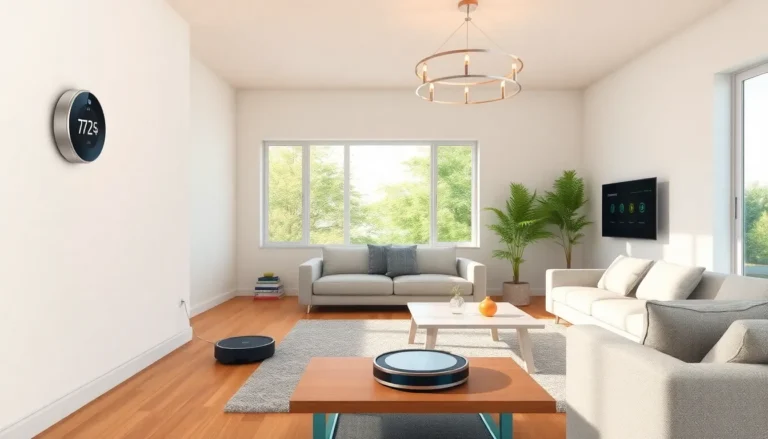Table of Contents
ToggleHomeownership can feel like a never-ending game of whack-a-mole. Just when you think you’ve tackled that leaky faucet or squeaky door, another issue pops up to steal your attention. Enter home maintenance plans—the superhero sidekick every homeowner didn’t know they needed. With a solid plan in place, it’s like having a trusty sidekick who reminds you when it’s time to check the smoke detectors or change the air filters, all while you sip your coffee in peace.
Understanding Home Maintenance Plans
Home maintenance plans serve as structured systems to help homeowners manage their properties effectively. These plans typically outline essential upkeep tasks and schedule reminders, ensuring nothing important is overlooked.
What Are Home Maintenance Plans?
Home maintenance plans provide a comprehensive outline of necessary tasks for property upkeep. They can include seasonal checklists, routine inspections, and maintenance activities. Each plan is tailored to the specific needs of a home, incorporating factors like climate and age of the property. Homeowners can receive reminders for tasks such as cleaning gutters, inspecting roofs, and servicing HVAC systems. A well-organized plan helps streamline maintenance efforts while preventing costly repairs down the line.
Benefits of Home Maintenance Plans
Home maintenance plans offer multiple advantages that ease the responsibilities of property ownership. They encourage proactive management, reducing the likelihood of sudden issues. Regular upkeep prolongs the lifespan of home systems and appliances. Homeowners also benefit from enhanced safety by addressing potential hazards, such as faulty wiring or outdated smoke detectors. A maintenance plan fosters peace of mind, allowing owners to enjoy their homes without constant worry about missed tasks. Regular adherence to these plans can even increase a property’s overall value, making them a wise investment.
Types of Home Maintenance Plans

Home maintenance plans come in various forms, each designed to meet different homeowner needs. Understanding these options helps in selecting the right plan.
Standard Maintenance Plans
Standard maintenance plans focus on essential tasks required to keep a home functioning efficiently. They typically include seasonal checklists like cleaning gutters and inspecting roofs. Regular inspections of heating and cooling systems also fall under this category. Homeowners can expect reminders for tasks such as changing air filters or checking smoke detectors. These plans generally cater to basic upkeep, making them ideal for those who want to ensure their home remains in good condition without extensive commitments.
Comprehensive Maintenance Plans
Comprehensive maintenance plans offer a more thorough approach tailored to the specific needs of a home. They encompass all tasks outlined in standard plans, but include additional services, such as pest control inspections and appliance servicing. This level of detail addresses concerns related to climate, age, and unique home characteristics. Homeowners who choose these plans benefit from prioritized management of systems and appliances, reducing the likelihood of unexpected breakdowns. A comprehensive plan fosters a proactive lifestyle, enhances safety, and ultimately contributes to preserving a property’s value.
Creating a Home Maintenance Plan
A well-structured home maintenance plan addresses specific needs and enhances property value. It enables homeowners to stay on top of upkeep for maximum efficiency.
Assessing Your Home’s Needs
Identifying unique requirements is the first step in creating a maintenance plan. Each home has its own characteristics, such as age, size, and local climate. It’s crucial to analyze systems like plumbing, electrical, and HVAC to determine their specific maintenance needs. Homeowners can also consider conducting an annual home inspection to assess potential issues that might arise. Gathering input from professionals can provide insights into necessary repairs and improvements. By documenting these assessments, homeowners establish a clear picture of their property’s requirements. This practice forms the foundation of an effective maintenance strategy.
Scheduling Regular Inspections
Scheduling regular inspections helps ensure ongoing property maintenance. Committing to routine checks for critical systems like roofs, gutters, and appliances creates a proactive approach to home care. Establishing a monthly or seasonal inspection schedule allows for early detection of issues, preventing costly repairs. Selecting qualified professionals for inspections guarantees comprehensive evaluations. Homeowners should keep detailed records of inspection findings and follow-up actions. Updating the maintenance plan based on these insights supports timely responses to emerging concerns. Consistency in scheduling contributes significantly to a home’s longevity and overall safety.
Choosing a Provider for Home Maintenance Plans
Selecting a reliable provider for home maintenance plans demands careful consideration. Homeowners should prioritize quality service and value in their choices.
Key Factors to Consider
Experience in the industry plays a crucial role when evaluating potential providers. Look for companies with established track records and positive customer reviews. Pricing structures should also factor into the decision; understanding the cost breakdown for services and any additional fees is essential. Providers that offer customizable plans can cater to specific homeowner needs. Inspect their customer support channels too; reliable communication ensures prompt responses to questions or issues. Finally, consider the range of services offered to verify they align with a homeowner’s unique requirements.
Questions to Ask Potential Providers
Inquiries can reveal much about a provider’s reliability. What services do you include in your maintenance plans? This question clarifies the extent of coverage provided. How often do inspections occur? Regular frequency of inspections contributes to effective home care. Ask about guarantees or warranties to understand what protections are available. Which professionals conduct inspections? Qualified technicians ensure tasks are performed correctly. Lastly, inquire about flexibility; can homeowners modify plans as needs change over time? Knowing the answers helps homeowners make informed choices.
Home maintenance plans are essential for any homeowner looking to simplify property management. By proactively addressing maintenance tasks and scheduling regular inspections, these plans not only enhance safety but also extend the lifespan of vital systems and appliances.
Investing in a tailored maintenance plan can lead to significant long-term savings and increased property value. With the right provider, homeowners can enjoy peace of mind knowing their homes are well cared for. Prioritizing a structured approach to home maintenance ensures that potential issues are tackled before they escalate, allowing homeowners to focus on what truly matters—enjoying their living space.





